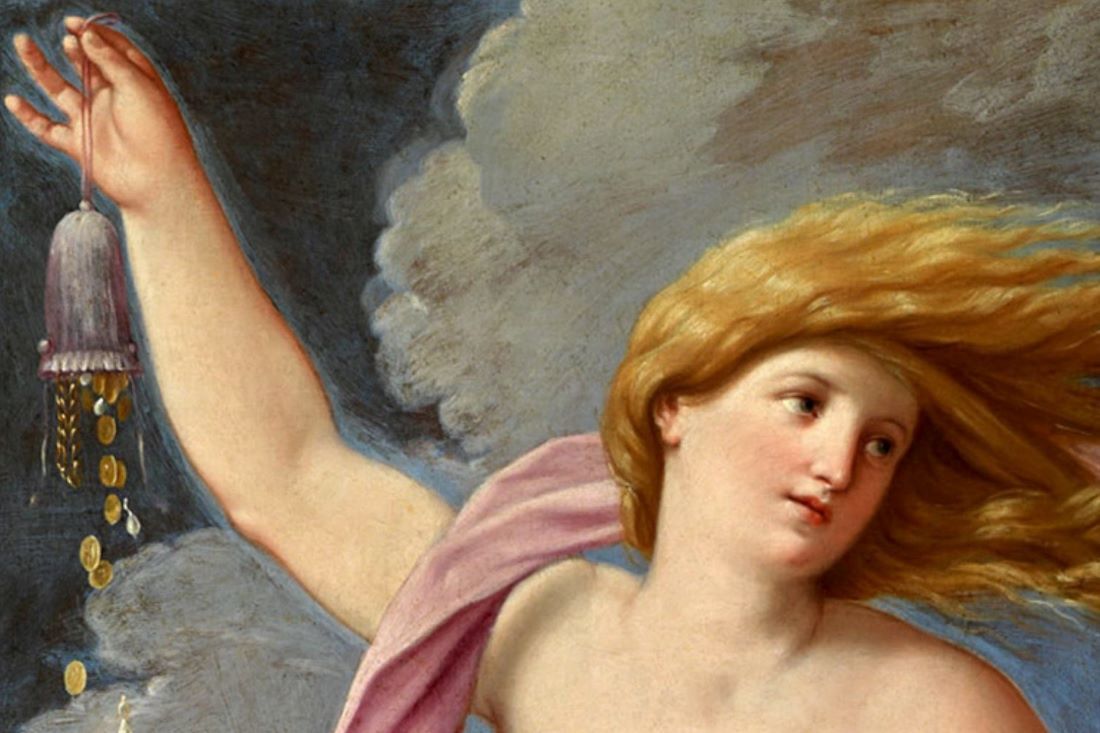Like so many people these days, I find myself searching for other sources of spiritual consolation and guidance now that access to the sacramental life of the Church is still mostly held in abeyance. Of course, there are scripture, the Liturgy of the Hours, and many other sources within the tradition. I have dusted off my copies of Manzoni’s The Betrothed and Camus’s The Plague, read them with a renewed sense of realism, found new meaning in them, and rediscovered through their many moving characters the moral mettle, common courage, and resolve to face the challenges and uncertainties of the COVID-19 global pandemic.
But perhaps on account of the tragic role Italy is playing in the pandemic, or because of the self-isolation the pandemic requires of us, I have found myself drawn more than usual to a work by the late antique Roman Anicius Manilius Severinus Boethius (c. 480–524/6). Boethius spent the early part of his short life translating Porphyry’s Isagoge and Aristotle's Categories and On Interpretation into Latin at a time when knowledge of Greek was relatively uncommon, with the ambitious goal of translating and commenting upon all of Aristotle’s works and Plato’s dialogues. It was his intention to show that these two ancient philosophical schools of thought were not really at odds with each other. He wrote five theological works, the fifth of which developed a definition of “person” that is considered a major contribution to Christology and trinitarian theology. But his most well-known text, and the one I think offers us guidance as we continue to shelter-in-place, is the one he wrote when the comfortable life he was living at the beginning of the 6th century was unexpectedly interrupted: The Consolation of Philosophy.
The beginning of the 21st century is a politically and ideologically inauspicious time to read and teach “old books” in higher education. Still, each semester I try to convince (unsuccessfully, I suspect) undergraduate students in my classes to keep their copies of Boethius’s The Consolation of Philosophy after the semester is over, as opposed to returning them for a few dollars at the university bookstore. By no fault of their own, they are unaware that this magnificent text has shaped virtually every significant Western theological, philosophical, and literary figure of note, and, more to the point given our particular moment in history, that for the past 1500 years it has comforted and consoled countless unknown and known men and women who have found themselves troubling times—even Dante finds solace in it when his beloved Beatrice dies in the Convivio.
My pitch to students is an iteration of C.S. Lewis’s apologia for reading “old books” rhetorically modified to be more an existential exhortation than an antiquated admonition. I tell students they will have to confront at some point in their lives, if not already, the fragility and contingency of the human condition when the tentative and tragic nature of human existence visits them by way of the unexpected death of a loved one, an unanticipated terminal cancer diagnosis, the unforeseen betrayal by a spouse, an uncontrollable global pandemic, or perhaps undeserved loss of a job.
When the memento mori comes in whatever dreadful form it takes, the digital diversions and social sedatives to which they so often and unwittingly seek comfort will fail to console them. And like Boethius in the 6th century, they too will need to disabuse themselves of the false goods many of them will have spent their lives pursuing. They too will need to heal their souls of the deleterious effects suffered as a result of their excessive devotion to what William James famously decried as the “bitch-goddess Success.” They will need the consolatory wisdom of old books like The Consolation.
Lewis thought that an old book like The Consolation could serve as a balm to the myopia of the modern mind. Old books are the “clean sea breeze of the centuries blowing through our minds,” he rhapsodically wrote. We read old books not to provoke some kind of antiquarian fetish for the past. Nor do we read them to conjure nostalgia to assuage our discontent with the present.
We read old books, Lewis believed, to “correct the characteristic mistakes of our own period,” whatever they might be. I would add, and I think Lewis would agree, that we read old books because they contain living voices from the past still speaking to us today. Voices from the past provide fresh perspectives on the problems of the present and edification to approach, endure, and hopefully move beyond them.
There are a number of ideological, cultural, political, and personal forces that impair my students' ability to hear living voices from the past. But the most formidable is that their historical consciousness is in thrall to the modern “myth of progress.” This is the comforting illusion political philosopher John Gray has confuted for the past three decades, which believes the human condition always will be better in the future than it has ever been in the past. The cultural logic of this myth produces fealty towards progress and the market and credulity towards the cumulative power of science and technology that makes the ancient world into which Boethius was born unimaginably strange and naïve to my students.
In their minds, it exists as a long nothingness, a scientifically benighted world without the technological wizardry and material comforts of late modernity, whose cultural obsolescence ended sometime around the Second World War, when their grandparents were born. They are incredulous that people in antiquity were as wise, smart, ingenious, selfless, compassionate, self-righteous, manipulative, foolish, violent, bawdy, licentious, and mistaken as we are today.
If his life had went the way he had planned it, Boethius would not have written The Consolation, and had his younger contemporary Cassiodorus not unearthed it, it would have remained unread. The circumstances surrounding its composition endow its verse with pathos, its hymns with poignancy, and its central argument that human affairs are governed by an all-encompassing divine providence with conviction.
By all 6th century measures Boethius was a favored child of Fortune. Despite losing his father at a young age, he was adopted by an even wealthier Roman Christian family. As a scion of a powerful and influential Roman family, he benefited from an education in the cultural riches of the classical Greco-Roman world, rhetoric, and training fit for a future imperial official. Like many ancient aristocrats, he was both an intellectual and a public official, and he advanced all the way to "Master of Offices" at Ravenna in the court of Theodoric the Ostrogothic king and Arian Christian.
But his charmed 6th century life came to an abrupt end in 523 when a political conspiracy landed him in prison on specious charges of treason. It was while he was imprisoned five-hundred miles from the comforts of his family and home, most likely enduring torture, and anticipating his impending execution that Boethius wrote The Consolation. When Lady Philosophy comes to Boethius in his cell she finds him in a sad state of self-loathing on account of losing his good fortune, family, reputation, and freedom:
I used to write cheerful poems, happy and life-affirming, but my eyes are wet with tears and the poems are those that only grieving Muses would prompt me to compose, heartbreaking verse from a suffering, heartbroken man.[1]
One would expect Lady Philosophy to sympathize with Boethius’s predicament and reassure him that God will bring good out of the evil he is suffering. But The Consolation is refreshingly free of unctuous euphemisms, pious platitudes, and spiritual pep-talks. It offers a peculiar kind of comfort and consolation that stings as much as it soothes Boethius’s troubled soul. The trouble with Boethius’s soul, at least, as he sees it, is that God seems to govern the rest of the world in an orderly way, but appears to allow human affairs to be conducted in a random, haphazard, and unjust way such that the wicked seem to prosper while the good suffer:
Many people have evil ideas and wicked intentions and hatch nefarious schemes, but to carry out one of these plans is, under the God’s watchful eye, a truly monstrous thing. And it was in such a circumstance as this that one of your disciples asked how, if there is a God, there can be evil. And if there is not a God, where does good come from?[2]
Lurking in the background of Boethius’s metaphysical malaise is a spiritual sickness that his isolation, indigence, and vulnerability have exposed. His malaise is symptomatic of disease dormant within his soul, a disease waiting to be activated by Fortune’s fickle nature.
What is the spiritual sickness of his soul? It is that age-old ailment deception. Boethius has radically misunderstood himself and his life. He has not seen himself and his life as God understands them. He must come to terms with himself and his life as they truly are. The problem is that Boethius does not see himself and his life in this way. In fact, his grief belies his desires being ordered, structured, and guided toward the One, True, and Highest Good in whom his true happiness resides.
Instead, his life has been driven by the pursuit of Fortune’s false goods of wealth, fame, prestige, power, reputation, high office, honor, and pleasure. To make matters worse, his pursuit of Fortune’s false goods has ended in failure. And so, Lady Philosophy’s charge to nurse Boethius back to spiritual health involves the unenviable task of demonstrating to him that he is mourning the loss of things that would not make him happy, anyway. She tells him:
All these paths that we think may lead to happiness are false trails and cannot take us to where we want to go. And I shall demonstrate, they lead in wrong and even wicked directions. Do you want to pile up large sums of money? Where will you get it, if not from those who have it? You want honors? How will you obtain them except by begging for them from those who can bestow them, thereby becoming not the proud man you wanted to be but a suppliant, a mendicant? You want power? You will lie awake at night worrying about your subjects’ treachery. You want glory and fame? You will be the toy of vicissitude, trying to figure out the mood of the people and drawn this way and that by their fickle preferences. You want pleasure? You become the servant of your body, which you know to be both frail and base. There are those who take pride in their bodies, but why? . . . The human body can be beautiful, but its beauty passes like that of spring flowers. And think of Aristotle's observation that if we had the keenness of sight of Lynceus the Argonaut and could see through surfaces, the beauty even of an Alcibiades would be a disgusting heap of guts and organs. It isn’t the human body, then, that is attractive, but only the weakness of human vision that makes it seem so. And anyway, however beautiful a human body may be, that beauty can be utterly destroyed in the course of a three-day fever.[3]
Lady Philosophy unfurls the metaphorical map of human desire before Boethius to show him the many misguided routes human longing for beatitude takes in its pursuit of true happiness. Admitting that he has lived his life in pursuit of many of these false goods is the first and most difficult step in reconfiguring his life. Once done, the meaning of his life, including his untimely and tragic death, can have new meaning within a grand metaphysical vision of a universe governed by a good God.
It is tempting to dismiss Lady Philosophy’s counsel here as a relic of ancient austerity, a promotion of a masochistic anthropology of submission and self-abnegation that great thinkers such as Nietzsche thought made Christianity abhorrent. True, Lady Philosophy gives Boethius cold comfort on this count. For she refuses to concede that the false goods so often mistakenly pursued in lieu of the True Good provide even the partial happiness they promise. Her unwillingness to yield this point sets Boethius’s argument apart from those who came before him, like Plato, Aristotle, and Augustine, and also those who would come after him. But to disregard Boethius on this point is to fail to hear the unflinching spiritual guidance and undomesticated wisdom The Consolation has to share with its 21st century readers.
Renunciation of the self-deception that besets Boethius’s soul creates the spiritual condition for him to see properly the world and himself in all their splendor and misery and to perceive them truthfully in the light of Love (not power, fear, and resentment), the force that governs the universe. The ancient affliction from which Boethius suffers comes to expression in its modern form through what Alasdair MacIntyre calls:
The self’s self-serving presentation of itself to itself, a presentation designed to sustain an image of the self as well-ordered, free from fundamental conflict, troubled perhaps by occasional akratic difficulties, but for the most part entitled to approval both by itself and others.[4]
Is the self-serving story Boethius tells himself in his dejected state the same one we like to tell ourselves? His suffering is undeserved (and it is!), because he has conducted himself in both his private and public lives with exemplary integrity (and he has!). And yet, stripped of the false goods around which he had constructed the narrative of his life, he is no longer able to enjoy the darkness of his self-deception. Now he must learn to see himself in the glaring and initially unsettling light of Truth. In this light he begins to see the universe he inhabits in its most intimate sense. He glimpses it in its infinite beauty and goodness:
O Lord, you govern the universe with your eternal order: you brought time itself into being, and all that marks its changes in the heavens and here on the earth, both moving and also in stillness. Nothing but your love could have prompted you to bring forth the matter and forms that together make up the world. From within yourself, ungrudging, you brought out the pattern of all that is good, inasmuch as it partakes of your own goodness. Its beauty is your beauty; your mind is the source of its grandeur.[5]
There is, of course, much more that could be said about the theological and philosophical vision of The Consolation and the moral and spiritual wisdom it contains for those of us living in the late modern world. There is, for example, the role that the natural desire for the good plays in God’s providential activity in the world. Something also could be said about the doctrine of divine simplicity and the metaphysical function it plays in humanity’s participation in the divine life of God. Something could be said too about the text’s influential argument for the compatibility of human freedom and divine foreknowledge, its understanding of God’s eternal knowledge, and its conceptually clever distinction between conditional and simple necessity. There are extraneous issues, too. The Consolation’s effusive references to classical Greco-Roman literature and dearth of explicit references to scripture and Christian faith baffle contemporary readers. In his greatest time of need, why does Boethius not turn to his Christian faith? But Voltaire once warned that “if you want to bore the reader, tell him everything.”
Where can one still hear the voice of Boethius in the angst and uncertainty of a 21st century global pandemic? For most of us, the COVID-19 pandemic is, and will continue to be, a prolonged inconvenience. But the virus has also reminded us of the tenuousness of our lives and created in us a real sense of social anxiety, isolation, and loneliness that borders despair. Deprived of the normal busyness of work and school, the usual public gatherings, social occasions, and celebrations, a deafening and disquieting silence fills the void where once we heard the cacophonous din of our everyday lives. The pandemic, Pope Francis recently said during his Urbi et Orbi blessing,
Uncovers those false and superfluous certainties around which we have constructed our daily schedules, our projects, our habits and priorities. It shows us how we have allowed to become dull and feeble the very things that nourish, sustain and strengthen our lives and our communities. The tempest lays bare all our prepackaged ideas and forgetfulness of what nourishes our people’s souls; all those attempts that anesthetize us with ways of thinking and acting that supposedly “save” us, but instead prove incapable of putting us in touch with our roots and keeping alive the memory of those who have gone before us. We deprive ourselves of the antibodies we need to confront adversity.
COVID-19 is not God’s judgement, Francis continues; it is our judgement: “a time to choose what matters and what passes away; a time to separate what is necessary from what is not. It is a time to get our lives back on track with regard to you, Lord, and to others.” Here, in Pope’s Francis’ words proclaimed in a rain-soaked, empty St. Peter’s Square, one can still hear a distant echo of Boethius’s voice.
[1] Anicius Manlius Severinus Boethius, The Consolation of Philosophy, trans. David R. Slavitt (Cambridge, Mass: Harvard University Press, 2008), 1.
[2] Ibid., 15.
[3] Ibid., 77.
[4] “What Has Christianity to say to the Moral Philosopher?” in The Doctrine of God and Theological Ethics, eds. Alan J. Torrance and Michael Banner (New York: T & T Clark, 2006), 22.
[5] Boethius, The Consolation of Philosophy, 84.


